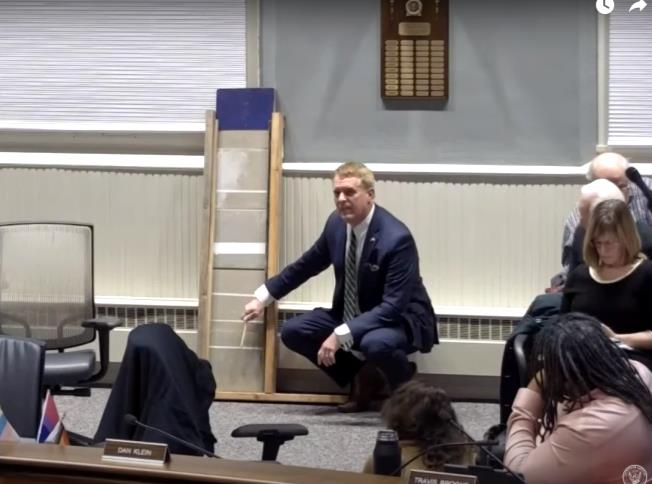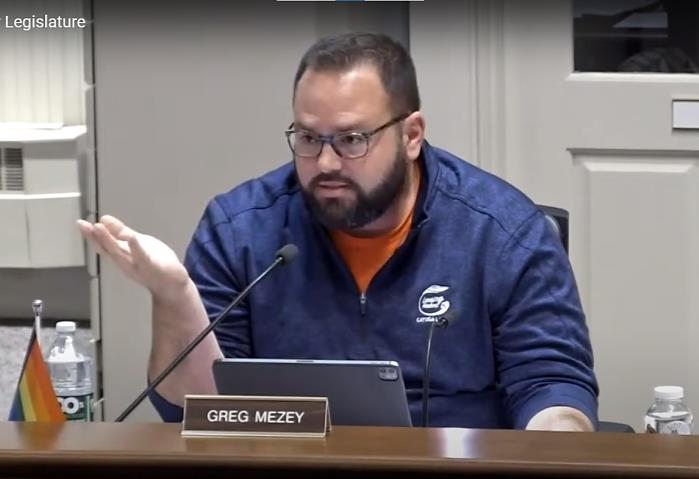Tompkins Legislature asks Hochul to take a hard look… but little more
by Robert Lynch; November 11, 2023
Stephanie Redmond, Enfield Town Supervisor, and Mike Sigler, Tompkins County Legislator for northern Lansing, live on opposite sides of Cayuga Lake. And most assuredly they have contrasting views on what the mega-corporation Cargill should do with its long-held underground salt mine that snakes under their lake. And that’s whether or not the company chooses to sell the mine to someone else.

Redmond is program manager of CLEAN (Cayuga Lake Environmental Action Now). She’s become their chief spokesperson. And CLEAN makes no apologies. It wants tougher oversight of Cargill’s underground mining. Sigler, on the other hand, has become the de facto cheerleader for Cargill, his hometown employer; creator of 350 local jobs and he claims an annual contributor of $400,000 in taxes to the Lansing Central Schools.
Last Wednesday, while Redmond was unavoidably indisposed , presiding over her monthly meeting of the Enfield Town Board, Sigler sat—he sometimes stood—in County Legislative Chambers. He spoke as the principal opponent of a messaging Resolution, passed by the Legislature that night, that urges Governor Kathy Hochul and New York regulators to demand Cargill conduct a full Environmental Impact Statement of its Lansing mine’s operations. The resolution also presses Cargill—or any future owner for that matter—to conduct an “end of life plan” to protect local residents should the Lansing mine ever close, or maybe even collapse.
The Resolution cleared the Legislature eleven votes to three. Redmond won, I guess. Yet what lawmakers finally adopted that night became so weak that one wonders whether the Enfield Supervisor would even welcome it. You’d have to ask her.
It was back in September that Stephanie Redmond and other environmental activists went before a County legislative committee urging pro-active measures after they’d learned that Cargill might put its mine up for sale. The committee didn’t act that day. But it eventually did place before the Legislature an ever-evolving Resolution that became quite transparently an exercise in incremental timidity.

The Resolution’s bold, original title, urging Hochul “to protect Cayuga Lake water quality by opposing all future salt mining in the underlying public lands,” (that is, under the lake), was the first to go. Committee Chair Anne Koreman changed it out Wednesday for a long-winded substitute that only calls for an Environmental Review, a closure plan, and a “Surety Bond to ensure safe closure.”
Then, legislator Deborah Dawson stepped in with her amendment, accepted as friendly by all, to further water down things. Koreman’s Resolution had specified a $1 Billion bond. (CLEAN’s website wants $10 Billion, by the way.) Dawson’s revision would let experts recommend an appropriate bond total. So what emerged from Wednesday’s action was a Resolution to be sure, but a Resolution missing a few teeth.
Over and over during more than a half-hour of discussion, legislators on the Left and on the Right made clear they were not calling for the closure of the Cargill mine. No one suggested that it be shut down, aside from several of the five members of the public who addressed the meeting on the matter under privileges of the floor. Had Redmond not had her “other job” to do, the one in Enfield, she might have become advocate number six.
“This Resolution, as it’s written, does not feel like we’re kicking Cargill out the door,” Legislature Chair Shawna Black observed during the evening’s discussion. “It sounds like we want to do our homework, and we want to know if there’s been damage done to the land,” Black continued. “And if there is, then there should be some accountability.”
“This Resolution simply asks that as Cargill seems to be preparing to sell the mine that there be a full, independent, and public evaluation of what the risks might be that are posed by the mining that’s already occurred, and based on those findings there should be a mine closure plan,” Dawson stated. In her opinion and that of others, too many of the findings that Cargill compiles itself get kept secret; too many documents reach the public heavily redacted.
Lansing’s Sigler, for one, insists there’s been no environmental damage. And he concludes there cannot be. He stood up from his desk, went to the wall, and stood by a vertical profile he’d prepared depicting Cayuga Lake on top and all the layers of salt beneath it. Sigler waved off CLEAN and its allies who allege Cargill’s mining may be leaking salt into the lake. How could it happen, the Lansing Republican argued. Cargill’s now mining a full 2,500 feet beneath the surface.
“The problem I think we have right now,” Sigler said, “is even though this is a much softer Resolution from where we started, a lot of people are thinking this is for a mine closure, and I don’t blame them.”
“And this group,” Sigler continued, presumably referring to the Resolution’s writers and those supporting them, “has also teamed with CLEAN, which is very clear on what it wants to do, and that’s mine closure. It says that on the website. It’s hired a PR firm out of New York City to push that idea of a mine closure. That is its goal.”
Sigler also referenced two unnamed State legislators—most likely Senator Lea Webb and Assemblymember Anna Kelles—who’d joined CLEAN’s activists on a conference call and are already talking about job retraining for Cargill workers and bailout money for Lansing taxpayers should the mine actually close.
Sigler, one will recall, is opposing Senator Webb in next year’s elections.
“Part of the problem I have with CLEAN,” Sigler continued, “is if you go to the website and you read about them, they call Cargill one of the worst companies in the world, if not the worst company in the world. That has not simply been my experience with Cargill.”
Sigler claimed the mine’s owner spent $5 Million to cover its surface salt, even though environmentalists purportedly acknowledged it would cost too much to do that. “Since Cargill has actually taken over the site, the lake has been less salinated, not more salinated,” the Lansing legislator maintained. “And there is simply no hydronic connection between the mine and the lake and between the mine and the aquifer.”
Dawson pushed back on Sigler’s logic:
“I don’t quite understand, if you’re as sure as you are that this mine is faultless, why you would resist having that evaluated by an independent agency and getting the information out in the public so that if CLEAN is crying Wolf, everyone will know they’re crying Wolf.”
“If you talk about a closure plan, that could be five months, five years, 50 years, 100 years, who knows?” Dryden’s Greg Mezey observed, “It’s just asking for how do things get wrapped up when it’s time to wrap this thing up.”

Mezey, like Ulysses’ Anne Koreman and just about every other legislator, bent over backwards to stress that what they were to adopt that night did not seek to close the mine. And an observer can read the politics. The intentional softening of what began as CLEAN’s unapologetic hardline advocacy may have evolved based on a careful counting of noses. Jobs carry votes, and the Resolution Koreman introduced would have gone nowhere had it not earned at least eight votes to pass.
Both Enfield’s legislators, Koreman and Republican Randy Brown, supported the call for the Cargill mine’s deeper environmental study. Ithaca’s Rich John and Groton’s Lee Shurtleff joined Sigler in dissent.
Shurtleff asked whether there’d ever been an economic impact study of a potential Cargill mine’s closure. Koreman responded it wasn’t “germane” to the Resolution. Shurtleff begged to disagree.
“I see the direction that this Resolution’s going in and what I think the end game is for some,” the Groton Republican stated. “And it’s hard for me to ignore the economics of this.”
Stephanie Redmond missed it all. She had her own meeting to run. But she and CLEAN’s most zealous advocates should heed what transpired downtown Wednesday night. The message was clear: It may be reasonable and prudent to demand a wealthy corporation bankroll a broader study of its actions so as to ensure a clean lake. But shutting down a salt mine and idling 350 angry workers in tough economic times is very much a step too far. And that goes even for Tompkins County’s most environmentally-conscious liberals. Proceed at your own risk.
###

